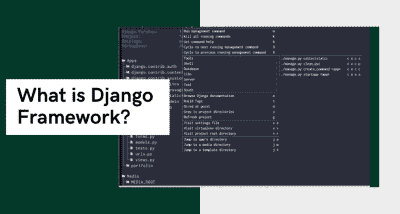Why is Java Programming So Popular?
- Amruta Bhaskar
- May 19, 2021
- 0 comment(s)
- 1563 Views

Although Java is a relatively new programming language, it is not exactly new. The year 2020 marks the 25th anniversary of this versatile programming language! Over the years, Java has maintained its position among the top three most popular programming languages in the world, and rightly so.
Today, Java boasts of an active community and is extensively used as the server-side language for numerous back-end development projects, including Big Data and Machine Learning projects and obviously, Web and Android development.
Java has consistently upgraded its programming efficiency for decades. It is one of the most popular programming languages and has maintained its position among the top three most popular programming languages. This is a natural and realistic software design approach. The Java objects can encapsulate data and behaviour that makes coding reusable and testing/troubleshooting easier.
In 1991, James Gosling, an engineer at Sun Microsystems, began developing a new language that he initially called Oak. Later on, the language came to be known as Java. The purpose of developing this new language was to build a system that would enable a large network of interactive consumer electronic devices that could be managed from a handheld remote controller. The concept didn’t excite the digital cable television industry at that time. Perhaps it was too advanced for them way back in 1995.
Developers began using Java, however, to develop applications for desktop computers. The Internet was beginning to catch on around the same time. In 1993, the World Wide Web became a public domain, thereby enabling the public to join in the fun. In 1995, the Pew Research Center reported that 14 percent of adults in the US were already “online.” Programmers started using Java for web applications and it soon became the preferred programming language for apps.
Java was better suited for the Internet and enterprise application development than older languages, such as COBOL, C, and C++. It provided support for Internet protocols, such as HTTP. Java enabled easier and faster application programming than COBOL or C because of its object-oriented design, integrated libraries, and run-time error detection capability.
An important reason that contributes to the immense popularity enjoyed by Java is its platform independence or multiplatform support. Java programs are able to execute on different machines as long as there is a JRE (Java Runtime Environment) in place. Be it mobile phones, PCs running Linux, macOS, or Windows, and even large mainframe computers, JRE is compatible with all of them.
Java is an evolving language, like real languages, and thus it has the unique ability to combine innovation with stability. Any code that was written way back during the humble beginnings of Java will still run on today’s faster and better JVMs. Additionally, the code will gain from:
- Latest profiling
- Memory management
- Native code translating
As the objects are free from references to external data, Java code boasts robustness. Though the programming language is simple, it is powerful enough to allow spawning a wide array of libraries and classes.
Some of the characteristics that have made Java so successful, as well as popular among programmers:
- Platform-independent
Java is designed to enable developers to “write once, run anywhere.” Applications developed using Java work across platforms, operating systems, devices, and cloud environments so long as a Java Runtime Environment (JRE) is installed on the system. Java is widely used to write applications for mobile and desktop devices that can run on any operating system, including Windows, Mac, Linux, and UNIX, servers, mainframes, laptops, and mobiles.
- Open-source
Java’s popularity is partly due to the fact that it’s open-source, offering developers a vast number of open-source tools and libraries that enable them to build high-quality applications at lower cost. Also, the open-source factor has enabled developers to work on improving and building the language, thereby contributing to Java’s development. Today, there is a large collaborative community of Java developers.
- Object-oriented
An object-oriented programming language enables processing in small easy-to-execute segments, thereby helping to make software design simpler and more efficient. With Java objects, programmers have the freedom to reuse generic code, as and when appropriate, instead of having to rewrite common code multiple times. Being relatively simple to understand, Java is easy to maintain and troubleshoot.
- Simple to learn and developer-friendly
Java has an easier learning curve than some other languages. It is possible to develop familiarity with Java tools, syntax, and styles in a fairly short time. Developers who learn Java find it easier to learn other.
- Very scalable
High scalability is one of the key factors behind Java’s adoption across products and environments, including IoT and cloud. This is one of the reasons why so many developers want to work with Java. Java’s development is ongoing, with new features, security improvements, and capabilities added periodically. The language is ideal for building applications for the future languages and can develop a wide range of programs.
- Used for mobile technology
Java‘s contribution to the evolution of mobile technology is significant. In the early years, Java was used to develop applications for Symbian OS, one of the older mobile operating systems. Then, Android developers started working with Java and a good part of Android was built using Java. Java was also used for most Android applications at that time. It is still one of the most popular languages for Android application development.
- Versatile
Being an extremely versatile language, Java is ideal for developing apps for the web as well as for mobiles, laptops, tablets, and other devices. Developers have access to thousands of API classes. Java Virtual Machines (JVM) can run on any OS.
- Supported by a robust and constantly-expanding community
The collaborative global community of Java developers is a source of solid support and has made a significant contribution to Java’s success. Thousands of developers work continuously to develop the language, sharing insights and offering guidance and feedback.
Indeed, Java is not the best language for all domains in the industry. However, Java is very versatile and benefits from the famous JVM. It is compelling and empowers you to create scalable & high-performance programs. It is more commonly utilized in our daily life than one might realize. Popular websites like YouTube, LinkedIn, and eBay use Java. Also, Java focuses on a consistent and robust development roadmap in security & performance that keeps it ahead in the competition of Java vs. Other Programming Languages.














